It seems odd to whoop and cheer after three hours of watching a woman die a harrowing death, but that strange dichotomy perfectly reflects Ermonela Jaho’s intense and passionate portrayal of Violetta, the rewardingly complex leading role in Verdi’s La Traviata. The Albanian soprano has received glowing notices for her numerous assumptions of the role worldwide, and now Sydneysiders can see for themselves exactly what she brings to the party along with the champagne and the bloodstained handkerchief.
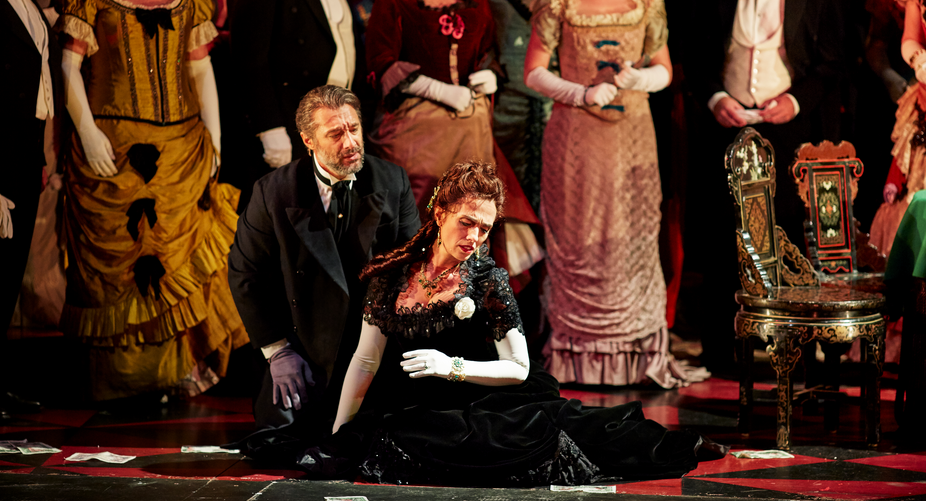 José Carbó as Giorgio Germont and Ermonela Jaho as Violetta Valéry. Photos by Keith Saunders
José Carbó as Giorgio Germont and Ermonela Jaho as Violetta Valéry. Photos by Keith Saunders
Of course, Elijah Moshinsky’s superbly observed and detailed production helps. With its heavy drapes, gaslit salons and air of claustrophobic excess it exudes an authenticity that must help any actor to feel at home in Dumas’ sexually charged world of the demimondaine. Michael Yeargan’s sets, sumptuously shadowed in Act I, evocatively stark and autumnal in Act II, tragically bare for the wretched dénouement, are wonderfully lit by Nigel Levings. Peter J Hall’s costumes are suitably glamorous and perfectly correct.
Into this world steps Jaho’s Violetta, a woman born of the conflicting desires for bourgeois respectability and the family she’s never had, and the need to keep selling herself to the highest bidder in order to keep up a lifestyle that offers the attractions of influence and not a little pain-numbing champagne. From the start, her illness is both heart-breaking and utterly convincing. Her initial refusal to give in sparks desperation and anger in a thrillingly fierce Sempre libera, but È strano! reveals a deep concern, Ah, fors’è lui is breathless and scared, while her transfixing Gioir’! taps into a pitiful fragility. Each of her many arias and duets, laced as they are with original thoughts and dramatic touches, merits an equally detailed and positive analysis.
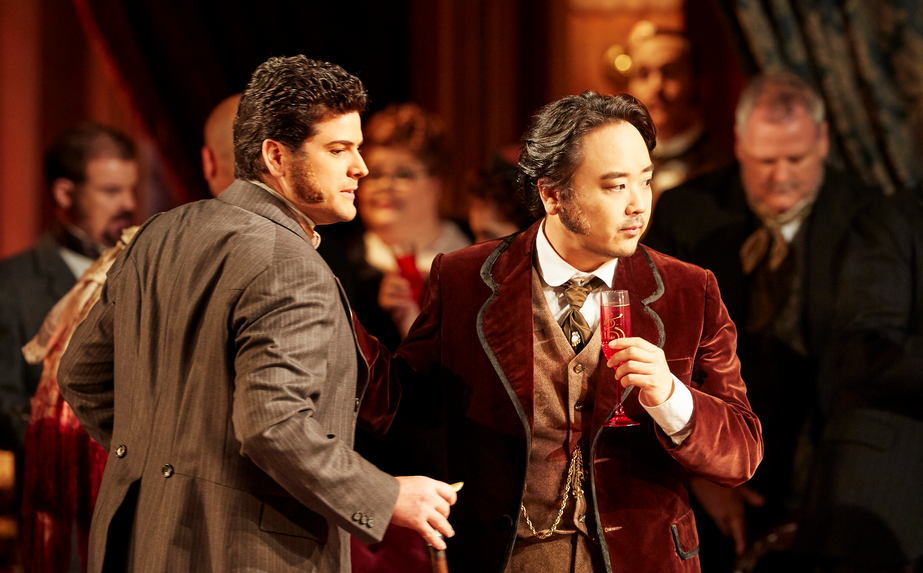 John Longmuir as Gastone and Ho-Yoon Chung as Alfredo Germont
John Longmuir as Gastone and Ho-Yoon Chung as Alfredo Germont
The great strength of this interpretation is Jaho’s ability to live and die in the moment, each and every moment. Anyone who’s ever studied singing will know that the ability to completely inhabit a drama while finessing Verdi’s musical demands – complex coloratura in Act I, controlled lyricism elsewhere – only comes with hard work, and then more hard work. Jaho has clearly put in the hours. The voice is perfect, sufficiently light at the top to deliver the grace of the courtesan, wine-dark in the lower middle register to break hearts, and not just Alfredo’s. Her flirtatiously dropped in high notes in Un dì felice make you gasp with delight, her rasping desperation in the final Gran Dio! morir sì giovane is agonisingly pathetic. In fact, the tottering delirium of the final death scene is the most powerfully convincing I can recall.
Of course, Jaho also comes trailing Callas comparisons, flattering but inclined to muddy the waters. While their two instruments are somewhat different – Jaho’s is certainly steadier at the top, warmer at the bottom – where they do merit likening is in the marriage of text and music. The mixing of the breath with the spinning of the vocal line is bewitching, the willingness to come off the note when drama calls compelling. When she asks Germont to embrace her as a daughter she conjures a whole world of missed chances; when she asks if a woman once fallen can ever hope for redemption she speaks for her whole sex; “I was too happy” sees her digging deep into her humanity.
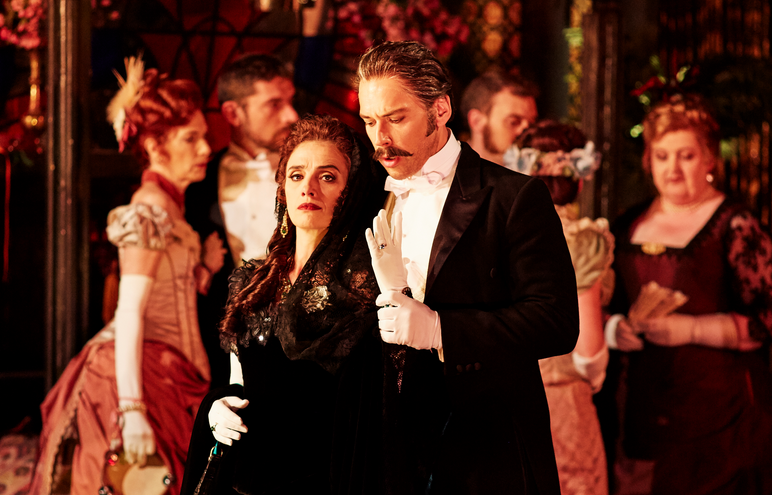 Ermonela Jaho as Violetta Valéry, Adrian Tamburini as Baron Douphol
Ermonela Jaho as Violetta Valéry, Adrian Tamburini as Baron Douphol
Of course, this isn’t a one woman show and her co-stars are each in their ways an excellent match. José Carbó’s Giorgio Germont has grown in stature since he first took on the role. Sparking off Jaho’s fiery defiance, he’s a fearsome adversary; his combination of determination and mounting admiration is sophisticated and subtle. The voice is steady and full at the top, flinty and authoritative lower down. His beautifully phrased Di Provenza il mar is easy and smooth as butter matched by his eloquent Pura siccome un angelo. The twists and turns of the long Act II scene with Violetta find two consummate singing-actors sparring hypnotically, therir voices blending sensitively as they come to their poignant mutual understanding.
This run’s first Alfredo is Korean tenor Ho-Yoon Chung (the Armenian Liparit Avetisyan takes over on March 6). It’s an attractive voice, fine and clean with a ringing top (though the top C crowning the cabaletta to De’ miei bollenti spiriti could be a little freer) and he blends very nicely with Jaho in Parigi, o cara. Tuning the lower register could merit a tiny bit of attention, and occasionally he feels a little rhythmically mechanical, but he’s never less than musically engaging. Dramatically he builds to a convincing denunciation at the end of Act II while he’s sympathetic in the final scene, which finds him at his best. The Brindisi, however, needs to have more joy in it, and the early wooing of Violetta and standoff with his father can feel stiff at times.
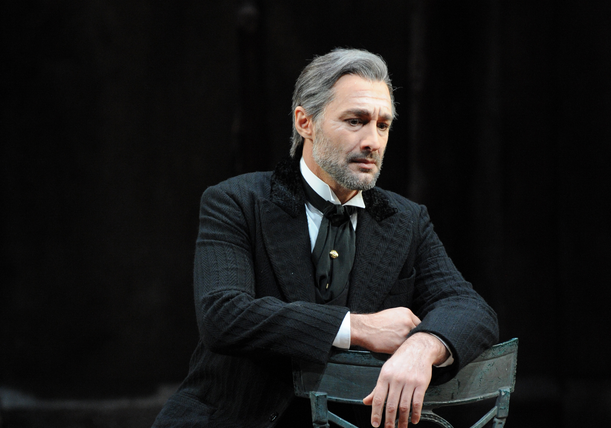 José Carbó as Giorgio Germont
José Carbó as Giorgio Germont
There’s flawless support too. Samuel Dundas and Adrian Tamburini draw detailed sketches of the Marquis and Baron respectively and are luxury vocal casting. Gennadi Dubinsky is a gentle doctor, Natalie Aroyan a caring, finely sung Annina, John Longmuir a nicely nuanced Gastone and Dominica Matthews a balanced Flora with less of the cat in her than previously. The Opera Australia chorus are tireless (hard to believe they have a matinee of Cav and Pag and an evening King Roger the day after opening night). Their ability to offer light and shade in even the most familiar rum-ti-tum choruses have earned them a nomination for Chorus of the Year in the 2017 International Opera Awards!
In the pit, Renato Palumbo proves once again that he’s one of the finest Verdi conductors on the circuit. His chamber-like textures in the preludes to Acts I and III, the dramatic ebb and flow he commands, and his enormous sense of urgency when required, all go to make for powerful music drama. Time and again he judges a suspension just right to allow a singer to do what he or she does best. The orchestra respond in kind with radiant strings and some lovely obligato woodwind – especially in the clarinets.
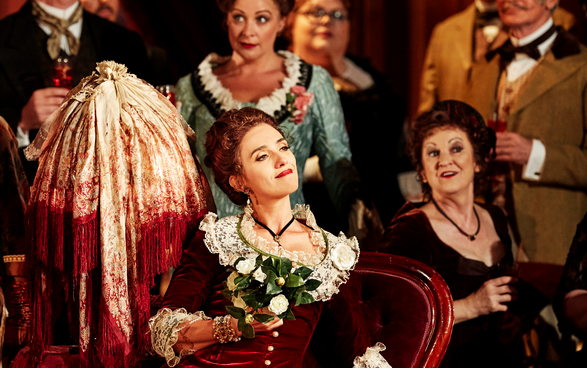 Ermonela Jaho as Violetta Valéry and the Opera Australia Chorus
Ermonela Jaho as Violetta Valéry and the Opera Australia Chorus
This production of Traviata will see OA celebrate their 200th performance of the opera, and really it couldn’t be much better. With Lorina Gore and Emma Matthews stepping into the lead later in the run, audiences can expect standards to remain sky-high, but Jaho is a great diva and her hothouse flower Violetta will break your heart. Do see it if you can.
La Traviata is at Sydney Opera House until April 1












Comments
Log in to join the conversation.